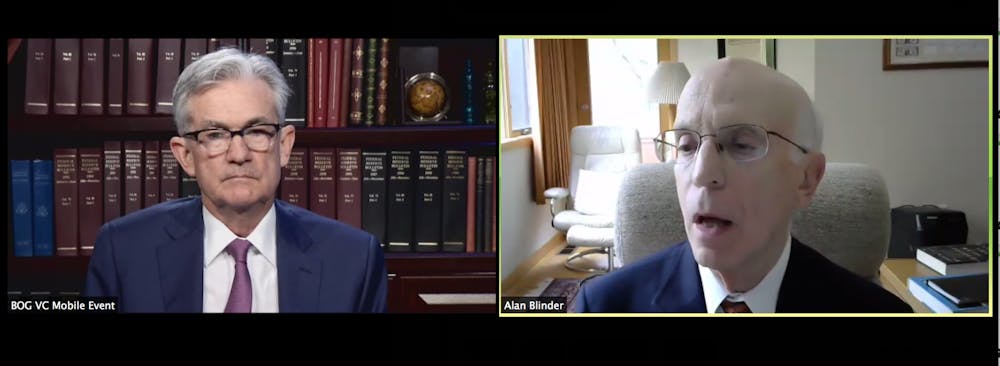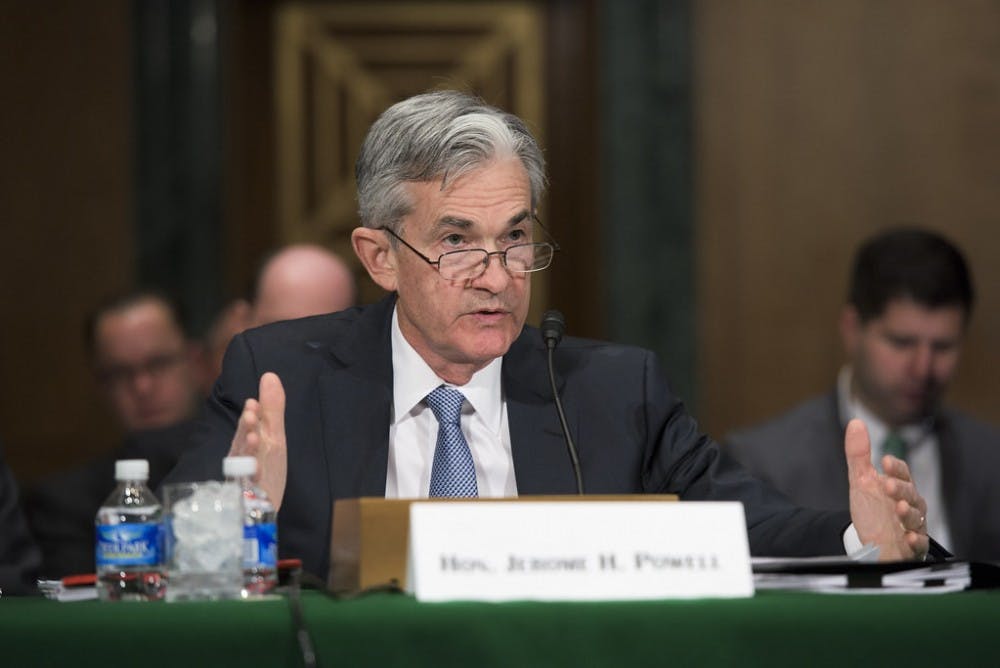Federal Reserve Chairman Jerome Powell ’75 discussed COVID-19’s impact on the United States economy and how the Fed hopes to slow the financial downturn during a virtual talk and question and answer (Q&A) session on Friday, May 29.
“This is a difficult time for many Americans. People have lost loved ones, many millions of people have lost their jobs, there’s a great deal of uncertainty about the future,” Powell said. “I’ll add that the Fed is strongly committed to using our tools to do whatever we can, for as long as it takes, to provide some relief and some stability now, and to support the recovery when it comes.”
The conversation included Professor of Economics and Public Affairs Alan Blinder ’67, who served as Vice Chairman of the Federal Reserve Board of Governors during the Clinton administration. Blinder asked Chairman Powell a series of questions and moderated a question and answer (Q&A) session with Zoom attendees.
During the conversation, Powell discussed the Fed’s role in the government, how it has operated during the pandemic, and his opposition to lowering interest rates below zero.
“This is an emergency of a nature we haven’t really seen before, and at the beginning of this my colleagues and I really saw that we need to be using our tools to their fullest extent,” Powell said. “That it would be very hard to explain to the public why we would hold back from doing that, at a time we saw a 50-year low in unemployment turn into an 80-90-year high in unemployment in the space of 60 days.”
Powell added that while the Fed has “crossed a lot of red lines” that had not been crossed before, he is confident that this is the time to do so.
Powell said that in February, when it became clear that the hope of the virus being contained “was gone” and markets became volatile, the Fed “tried to restore market function” in various ways — including tools previously unused in “modern history.”

FED Chairman Jerome Powell ’75 (left) and Professor Alan Blinder ’67 (right) on Zoom.
Photo credit: Zachary Shevin / The Daily Princetonian

Blinder also asked Powell about the Fed’s “Main Street Lending Program.” Announced two days ago, the Fed established this program to support small and medium-sized businesses that were in good financial shape prior to the pandemic and do not have access to capital markets.
While large companies have access to these markets and Congress “has done a lot for smaller companies” with the Paycheck Protection Program, “this is for the companies that are in the middle.”
“It is very challenging because it’s an extraordinarily diverse space. The credit needs of different kinds of companies in different industries are extraordinarily diverse — some of them borrow against assets, some against cash flow, and some are much more volatile than others,” he said. “Trying to figure out the right credit products for that market is challenging.”
He added that the Fed is “days away” from making its first Main Street loans.

To Blinder’s clarifying question about the size of such loans, Powell said that “the current structure is that the smallest loans would be a half a million [dollars] and the largest ones would be over 100 [million dollars]” and that he could imagine the Fed “expanding on either end.”
During the Q&A, one Zoom attendee asked Powell if he believes Fed policies are “likely to lead to more income inequality in the United States.” Powell’s response: “Absolutely not.”
“The pandemic is falling on those least able to bear its burdens. It is a great increaser of inequality, if you just look at the labor market reports [...] you will see that it is low-paid workers in service industries who are bearing the brunt of this,” he said.
“Everything we do is focused on creating an environment in which those people will be able to keep their job or get a new job,” he added. “I think we have to keep our focus really tightly on that goal of the labor market, and supporting the labor market.”
Blinder also asked the Fed Chairman to explain his opposition to pushing interest rates into negative territory despite “quite a few European Central Banks and Japan” having done so. Powell has previously stated that the Fed would keep rates near zero “until the economy is well on the road to recovery” but has opposed moving rates below zero.
Powell said that the U.S. has certain “institutional arrangements” that would not accord with negative interest rates, though he “wouldn’t say those are decisive.” In general, he explained that this is not due to a difference between the U.S. and the countries that have employed negative rates, but rather a “difference in understanding.”
“The evidence on whether it actually works is mixed. There are clearly some negative side-effects,” he added. “It’s just not clear to my colleagues and to me on the Federal Open Market Committee that this is a tool that would be appropriate to deploy here in the United States.”
Another Zoom attendee asked what would happen if there’s “another wave” of the virus in the late fall and how that might impact the Fed’s policies. In his response, Powell clarified that the Fed employees “are not experts on epidemiology, the spread of pandemics, or anything like that,” and that they “don’t know anything the general public doesn’t know.”
In the case of a second wave, Powell said the Fed would “continue to react,” but that he would be more worried about the impact on Americans’ confidence.
“A full recovery of the economy will really depend on people being confident that it’s safe to go out and safe to engage in a broad range of economic activities,” Powell said. “I think a second wave would really undermine public confidence and might make for a significantly longer recovery and weaker recovery.”
Powell also reflected on the pandemic’s global ramifications, noting that now is a very challenging time for countries without the medical infrastructure and ability to conduct fiscal and monetary policy that the U.S. possesses.
“For all of the suffering that’s going on in countries like the United States and Western Europe, you’re seeing even worse outcomes in many of the poorer countries,” he said, adding that international organizations “are going to need a lot of support” from countries such as the U.S. to deal with those issues.
Powell also spoke on the issue of transparency and the responsibility he believes the Fed has to keep citizens informed about monetary policy decisions during the pandemic.
“We’re disclosing just a lot of information — much more than the law actually requires us to disclose,” Powell responded. “For all of the facilities under the CARES Act, we’ll be disclosing the name of the borrower, the amount, and we’ll be updating those on a fairly regular basis.”
Powell credited Blinder and his former Fed colleagues for transitioning the Fed from the “old theory” of “tell them nothing” to the view that “transparency is your friend, and markets will do the work for you if people understand what you are doing.”
He added that the Fed works closely with elected representatives to stay in communication, to communicate publicly through outreach, and “to try and avoid misunderstanding.” On explaining monetary policy to everyday Americans, Powell said it is a difficult but necessary task that helps the Fed “maintain its democratic legitimacy.”
“Most people have better things to do in their life than understand the details of central banking,” Blinder said. “But our obligation is to be as transparent as possible and to patiently and clearly explain ourselves to the public that we serve.”
The Q&A session ended with a submitted question from Susan Powell ’20, asking her father: “Chairman Powell — Do you have a favorite child?”
“I love all my children equally, but I certainly think Susan Powell deserves special congratulations here today for graduating in the Class of 2020,” Chairman Powell replied.
“The Class of 2020 will long remember the end of its senior year,” Blinder added.

Chairman Powell's daughter Susan ’20, a Woodrow Wilson School concentrator, asks an important question via Zoom.
The event was sponsored by the Griswold Center for Economic Policy Studies and held as part of the University’s virtual reunions programming.








